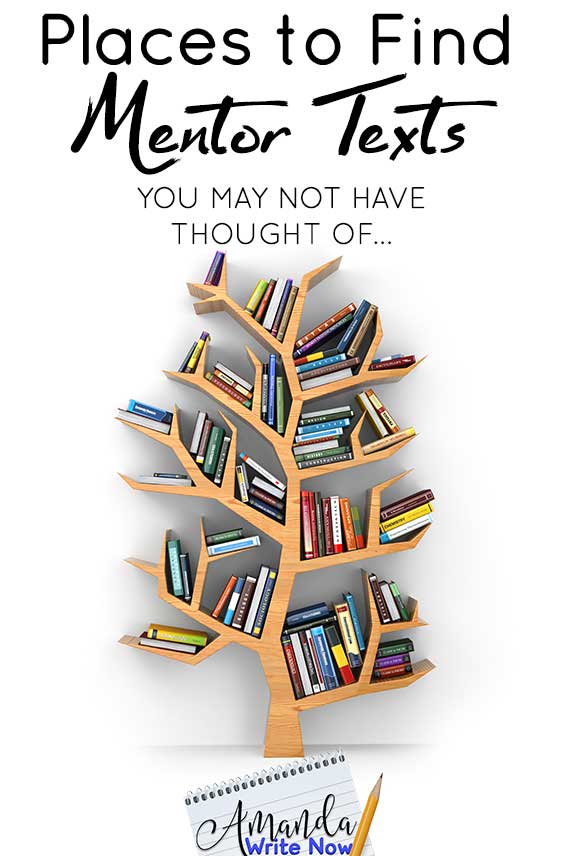
One of the biggest challenges many writing teachers face is finding quality mentor texts. But is it really all that big of a challenge when we look closely at what mentor texts really are?
The phrase “mentor text” is pretty new. Ralph Fletcher, a guru in the writing instruction world defines mentor texts as, “Any writing that you can learn from…”, this definition is so satisfying. It’s satisfying because often, one of the biggest challenges about being a writing workshop teacher is finding mentor texts. But, this definition opens a plethora of texts up to us.
It is also important to note that the phrase “writing sample” has been around a lot longer than the phrase, “mentor text”. I’ve been teaching for 12 years and in that time “writing sample” was the term used most frequently until those who started the workshop model popularized “mentor texts”.
So there is no difference between the mentor texts and writing samples. They are the same thing.
Why is this important?
This is an important realization because it solves the problem many writing teachers face: where can I find quality mentor texts?
The answer is everywhere!
It might take a little digging, but you can find mentor texts/writing samples everywhere. Below you’ll find a list of nine pretty obvious places to look for mentor texts/writing samples.
Check out this video about the article too! Don’t mind my funny monster face, lol.
Places to Find Mentor Texts…
Student Writing
One of the best places to find mentor texts/writing samples is from your own students. If you choose to do this, make sure you are choosing writing that is strong and exemplifies the skills you want your class to exhibit in their own writing.
Never use student writing to critique or point out errors in front of the class.
There are multiple ways you can go about using excellent student writing as your mentor texts/writing samples. 1. If you teach multiple classes you can use a student’s writing from 1st period as your sample for 2nd period and so on. Just take the name off. 2. If you taught the same unit the previous unit, save writing from students who did a wonderful job to use as mentors for the next year. 3. If you are an elementary school teacher or have only one class, ask students for permission to use their writing as a sample for the rest of the class.
Your Own Writing
This is probably the most challenging option. It is also the most powerful option to get a peek into the obstacles students face when writing. Another important thing to consider is when you write what you expect your students to write you’ll have those pieces for years and years to come, you only have to do it once! Here are a few of my own pieces based on genre:
- Personal Narrative: Out of Bounds
- Informational Writing: 5 Super Simple Games to Play with Students Anytime (I share articles from my website all the time)
- Argumentative Writing: Violent Video Games
Fiction Books
If you are an English teacher, most likely, you are also an avid reader. If you aren’t that’s okay, you can still try this too. While reading your favorite books, mark places that exemplify the skills you want students to produce in their narratives, memoirs, fictional short stories or poetry. Mark places that describe settings and characters. Mark places that use dialogue and places that use interesting punctation, transitions and vocabulary. Mark anything and everything you could use to show students how the pros make creative writing effective and engaging.
Nonfiction Books
If your students are writing informationally then any nonfiction book can be a mentor text. Even if they aren’t writing entire books, parts of nonfiction books can be used to show students how to write informationally. Students can learn about organizational structures such as compare and contrast, bulleted lists, heading and subheadings from nonfiction books. They can learn how to interest readers while also providing facts. There are so many writing skills that can be taught through nonfiction books. Check out this vocabulary list of informational skills you can teach.
Curriculum Books
There are many mentor texts/writing samples included in curriculum books. All the books mentioned here are affiliate links. This means that if you purchase any of them I will receive a commission. All The Units of Study books come with a CD and included on that CD is a goldmine of writing samples you can use with the units. The best part is that Lucy and her crew tell you exactly how to use the mentor texts throughout the unit!
I recently boughtThe Quickwrite Handbook and love it! It includes over 100 mentor texts for teachers to jumpstart their students’ writing. It has excellent ideas for how you can use quick writing and mentor texts to engage even the most resistant writers.
Magazines
Magazines are another source for learning about informational writing. Magazines have all the things that nonfiction books have, they are just much more visual and contain advertisements of course. These advertisements could be used to teach the persuasive appeals of ethos, logos and pathos!
Newspapers
Newspapers are a wonderful place to find informational and argumentative writing samples. Editorials and letters to the editor are always included in a newspaper. In order to use newspapers and mentor texts you need to start collecting! Some newspapers are free, whereas others require a payment. I only pay $4 a month for a New York Times online subscription and I can get reimbursed from my school because I use my subscription to gather argumentative mentor texts for students. Once you get a subscription to your local newspaper or start grabbing free community newsletters bring them into your classroom for your students to peruse. Students will not only gain inspiration for their own writing, they will also become informed about their own community and world around them.
Websites
I love finding websites that provide mentor texts. It’s a hobby of mine. Below you’ll find two articles that provide links to my favorite places to find mentor texts:
Podcasts
Podcasts are full of stories, information and opinions! They are a wonderful and engaging place to find mentor texts in the form of audio and text (most podcasts are transcribed too). Here are some awesome links to articles with podcasts you might consider sharing with your students.
But, how would you use a podcast as a mentor text, you may be wondering? First, listen to an episode of a show that sounds intriguing to you and that you think your students might enjoy. Listen, with pen and paper close by. Write down some writing skills you think students could learn from the podcast such as building tension, description, humor, transitions or organization. The key is to listen like a writing teacher. You’ll find all sorts of writing skill gems if your looking, I mean listening for them.
TED Talks
Just like podcasts, TED Talks are also transcribed. If your students are giving speeches then you should definitely consider checking out these short TED Talks that kids will love and learn from at the same time…
Again, just like podcasts, TED Talks are an unconventional place to locate mentor texts.
So, how do you use videos as mentor texts?
Well, you might know this already, but if you look below every TED video on TED.com you’ll see three links: details, transcript and comments. If you click “transcript” you will be directed to a full clickable transcript! All you have to do is highlight the text in the transcript and copy and paste it into your favorite word processor to print and analyze with students.
Before you start analyzing though, you should allow students to watch the talk in its entirety. You don’t want to suck the enjoyment out of watching the talk by analyzing it during students’ first encounter.
Actually, this goes for any mentor text that you introduce to your class. Always, allow students to experience the text in its entirety before analyzing it for writing skills.
Wrap Up
We’ve have two very important epiphanies in this article…
- Mentor texts and writing samples are one in the same
- There are many obvious places you can find mentor texts/writing samples
If you’ve found this article beneficial to your teaching, share it with your colleagues or on social media. Also, please leave a comment below with your thoughts, questions or opinions about the topic of mentor texts. I’d love to hear from you!
More Resources…
Best Places Online to Find Mentor Texts
Middle School Mentor Texts by Genre




0 Comments